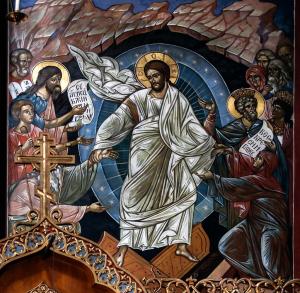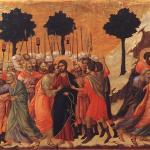
Christ is Risen! Indeed, He Is Risen! Let us celebrate his resurrection from the dead!
The Christian faith is faith in Christ, that is, the resurrected Christ. We believe Christ is not just merely a good man who taught others how to be good, even though he was that; we also believe that he was the one who let his life be taken from him so that he could take on the powers of sin and death and overcome them. In him, we are shown that death and sin do not have the final say as to who we are and what our end should be like. Certainly, death lies before us all. Moreover, it is clear, death is something which causes great pain and suffering, which is why it can be said to be an evil, but it is an evil because it has been tainted by sin. It has become, as it were, our end because we find the dead cut off from the living, making it seem as if they might be no more.
Death was never meant to be our end, but rather, merely the end of our temporal existence. It was meant to be, and so should be, merely a point of transition, where we move from temporal existence to eternal life. Christ, in his resurrection from the dead, makes this possible. We are shown that there is life beyond death, though the life which comes out of death transcends the kind of life which came before it. Now, in and with Christ, the entanglement of sin with death has been overcome, so that instead of being a point of material dissolution leading to spiritual corruption and annihilation, death is once again a point of transition. The sting of death, sin, no longer rules over the kingdom of the dead. Christ is the lord of life and death.
This is not to say death is a good to take and use lightly. Many things are good, but they can still be abused. Death can still be abused. We still need to appreciate the value and goodness of temporal existence. We should not embrace death before it is time. What we need to do is live our life, acknowledging and defending the good of temporal life, and then, when it is time, acknowledge the good which can be found in death, to let ourselves embrace the good in death so that by death we can share in Christ’s victory over sin and find ourselves joining in with him in the glory of the resurrection. But that process is not completely without sorrow, and that is because of how we have lived our lives. We will have to go through purification in death; we will find ourselves coming face to face with Christ in his judgment of sin. As long as we hold onto sin, we will face and experience that judgment, but once we truly let it go and let the grace of Christ heal us from its wounds, we will then be able to complete our transition from death to eternal life. Then, we will rise with Christ, transcending death and the power of sin itself, all because Christ was the one to break apart the connection between sin and death. Jesus is the firstborn of the dead; he opened up the womb of death so that all who come upon death can then come to eternal life.
The resurrection, in this regard, is a demonstration of the divinity of Christ. While he certainly is a man, he is not only a man, he is also God. He is the one who had the power not only to lay down his life, but to take it up again (cf. Jn. 10:18). In his resurrection, he takes up life again, but now in a new way, that is, not in the way he had it before his death. He now has eternal life and can share it to the whole of creation. He established the way beyond the power of sin. Christ accomplished it as the subject who is lord of death and life. But how can that be? The only true lord of both is God. Thus, he must be God. Only God could become a man who so completely that he can lay down his life, give it to the hands of others, let death and sin do all they would like to do to him, and come through in the end, greater than ever before. Jesus is glorified thanks to and in his self-giving kenosis. Let us be attentive and understand this, so that we can follow after him. We are to do so by giving ourselves over to God, trusting God that God will take us and transform us, giving us a share in the triumph of Jesus’ resurrection. This is what Christianity is about – giving ourselves over to God in trust, letting everything go, whereby we will find we will not only receive everything back, we will receive something far greater than what we gave up thanks to the deifying grace of God gave to creation in the kenotic act of the Son of God:
In his life, his death and his resurrection Jesus Christ shows that God, incarnate in him, is above law and reason, that he can do far more than immobilize evil by his strength or unmask it by his light; he is the Spirit of life and love, and he redeems and saves that nature which has fallen into rack and ruin, transforming its falsities into truth, its wickedness into goodness – and in this act of triumphant love God finds his own glory. [1]
God is above law and reason, above all our ideologies and attempts to comprehend the divine nature, indeed, above all the ways we try to regulate grace in and through our religious teachings and practices. This is not to say those things are completely useless; they can and do have great value, but the value is limited and must always make way for the greater, transcendent work of God. Instead of insisting things always remain the same, being stuck as they are, we should always be ready to have them reconfigured, reformed, in the light of grace. When we do this, we will get a greater glimpse of Christ at work. We will see how the resurrected Christ, reconfiguring all things, making all things new, is continuing the work of creation itself, bringing creation to its proper end. The only one who can do that is God. If we carefully look at what Jesus is doing in the resurrection, we can see his divinity at work. This is why it is appropriate that the Byzantine tradition returns to the beginning of John for its Paschal reading. We are to understand how the Logos, who was with God and is God, began the work of creation, for then, we can see how the resurrection and glorification of creation is but the continuation of that work; is one and the same Logos, one and the same God, in whom and through whom all things are made and remade, created and glorified:
In the beginning was the Word, and the Word was with God, and the Word was God. He was in the beginning with God; all things were made through him, and without him was not anything made that was made. In him was life, and the life was the light of men. The light shines in the darkness, and the darkness has not overcome it (Jn. 1:1-5 RSV).
The darkness of sin could not undermine creation; it could not overcome the light and life of the Logos. The resurrection is not just the revelation of the end of sin and its power over us, but also revelation that the work of creation is an ongoing act. Its fulfillment is found only in the resurrection itself. All things are made, or are being made, in and through the Logos, and the completion of their creation lies in their own entrance into the eschaton, beyond the power of sin ; in it, all things will find who and what they truly are. And this is because Christ has established death to be only the end of our beginning. For, once sin has been overcome, death itself can come to an end, leaving only eternal life.
[1] Vladimir Solovyey, God, Man & The Church. The Spiritual Foundations Of Life. Trans. Donald Attwater (Cambridge: James Clarke & Co., 2016), 76.
Stay in touch! Like A Little Bit of Nothing on Facebook.
If you liked what you read, please consider sharing it with your friends and family!
N.B.: While I read comments to moderate them, I rarely respond to them. If I don’t respond to your comment directly, don’t assume I am unthankful for it. I appreciate it. But I want readers to feel free to ask questions, and hopefully, dialogue with each other. I have shared what I wanted to say, though some responses will get a brief reply by me, or, if I find it interesting and something I can engage fully, as the foundation for another post. I have had many posts inspired or improved upon thanks to my readers.













